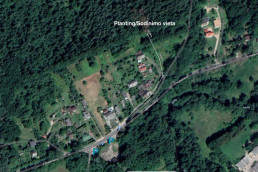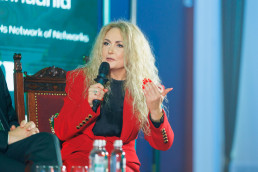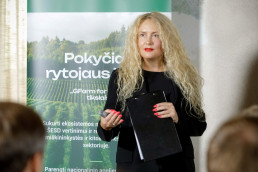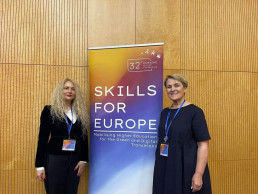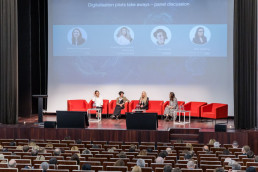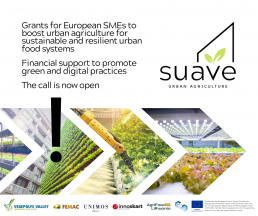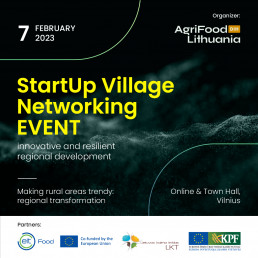Planting over 300 birch trees before the AgriFood Forum 2023: the public is welcome to join
In response to the role of the forestry sector and the community in mitigating climate change, a symbolic birch planting event will be held on November 13 at 11:00 AM near Vilnius. This event is part of the AgriFood Forum 2023 and will feature participation from the Vice Minister of Environment, Kęstutis Šetkus. Life Terra, one of Europe’s most active climate action initiatives, supports the initiative. We welcome everyone to join this free educational activity and plant a tree, including forum participants, families with children living in the capital, and visitors who care about a greener future.
Supported by the Ministry of Environment
The area along A. Kojelavičiaus Street in Pavilnys (coordinates: 54°41'51.6"N 25°22'13.3"E) has already undergone sanitary clear-cutting, and the 40-are plot owned by the Vilnius municipality is prepared for the next stage. The initiative’s partners, the NGO “Myliu mišką”, which aims to increase forest cover in Lithuania, are handling the plot and the preparatory work.
Students will also join the AgriFood Forum 2023 organizers and speakers, the Vice Minister of Environment, the head of the State Forest Enterprise, Valdas Kaubrė, and other government representatives to plant the trees. We will provide for each participant with the necessary tools and an educational program to ensure the young birch trees take root – with more than 300 trees expected to be planted.
“Forming collective consciousness on issues such as climate extremes, reducing the impact of urbanization, or preserving biodiversity begins at the highest levels of policy strategy. However, applying these strategies in real life is much easier with all stakeholders involved. I support the forum organizers' aim to bring the search for safe, healthy, sustainable future prospects closer to the general public. Vilnius is already renowned as perhaps the greenest city in Europe. I believe that our country has many people whose conscious actions – from participating in global initiatives to taking personal responsibility for environmental protection – make a significant contribution to Lithuania’s ambassadorship in addressing global challenges,” says Vice Minister of Environment Kęstutis Šetkus.
Partnership with a European foundation
Representatives of the Life Terra project, supported by the European Commission’s LIFE program, initiated the idea to plant trees in a specific part of the capital as a symbol of growing international, interdisciplinary commitment to improving the planet.
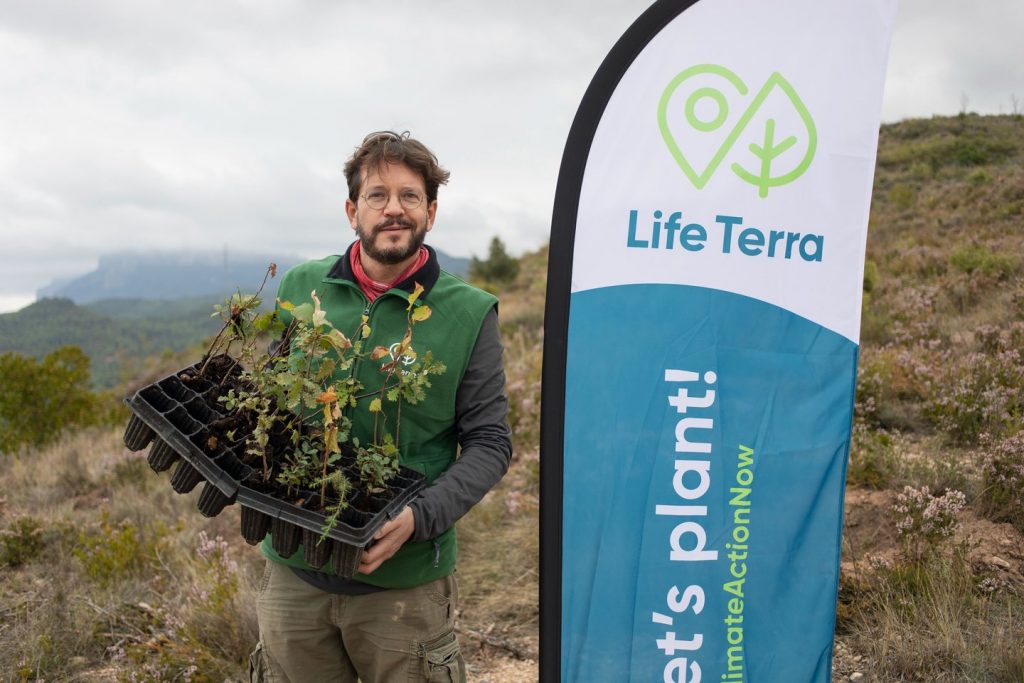
The foundation of the same name, based in Amsterdam and Barcelona, collaborates with partners across Europe to enable people to contribute to climate change mitigation by restoring degraded land, developing tree monitoring technologies, and educating future generations. The founder, Sven Kallen, is one of over 60 local and foreign experts who will share their insights at the AgriFood Forum 2023, held on November 14 at Vilnius Town Hall.
Responding to carbon footprint reduction strategy
According to Kristina Šermukšnytė-Alešiūnienė, CEO of AgriFood Lithuania, the EU increasingly focuses on forming a carbon credit market as part of implementing the Green Deal. Trees are one of the main natural sources of GHG absorption.
“Our initiative partners “Myliu mišką” shared an interesting fact that in estimation about five trees need to be planted to obtain one carbon credit. During their lifecycle, they could collect one ton of CO2. The symbolic birch planting that opens AgriFood Forum 2023 is just a step toward European carbon footprint reduction goals. However, I am confident that this year’s event will generate many pragmatic solutions that will accelerate the necessary changes in the agri-food sector and related industries,” she remarks.
The cluster and digital innovation hub are organizing the event in collaboration with the European Parliament, Business at OECD (BIAC), and the Lithuanian Confederation of Industrialists. Participate in the forum for free, or watch online after registering at www.digitalfarm.lt.
A. Novo re-elected President of the European Cluster Alliance, K. Šermukšnytė-Alešiūnienė becomes Vice-President
Antonio Novo, President of the Spanish Federation of Clusters and managing director of the Aragonese cluster IDiA, was re-elected as President of the European Cluster Alliance for a further four years at the General Assembly of the European Cluster Alliance in October this year. Kristina Šermukšnytė-Alešiūnienė, Director of the Cluster and Digital Innovation Centre AgriFood Lithuania and Director of the Lithuanian cluster network KlasterLT, has become the new Vice President. An expert in the agrifood sector was awarded the title of the European Cluster Manager of the Year 2022.
In addition to K. Šermukšnytė-Alešiūnienė, the Alliance’s Board of Directors has been joined by another woman, Montse Daban (Council of European BioRegions - CEBR). She will be the ECA representative in the “Friends of the EEN” group to strengthen the relation between the European Clusters Alliance and the Enterprise Europe Network (EEN).
Hervé Floch (AFPC, France) was renewed as Vice-President, and Daniel Cosnita (CLUSTERO, Romania) as Secretary. Both have been greatly involvement in the development of the European Clusters Alliance since its foundation. Krzysztof Krystowski (Polish Cluster Association) stepped down as Vice-President after several years of dedication to the association, due to a new job position.
Joining strengths, creating synergies
Representing 22 national cluster networks and ambassadors from across Europe, the European Clusters Alliance brings together more than 900 clusters, encompassing 150,000 of the continent's leading companies, universities, research centres and public institutions. These clusters, strategically aligned through the European Clusters Alliance, seek to reinforce competitiveness and innovation in every corner of Europe. ECA’s activities are led by the vision to position industrial clusters as key agent in the European innovative ecosystem for the development and growth of our economy and competitiveness.
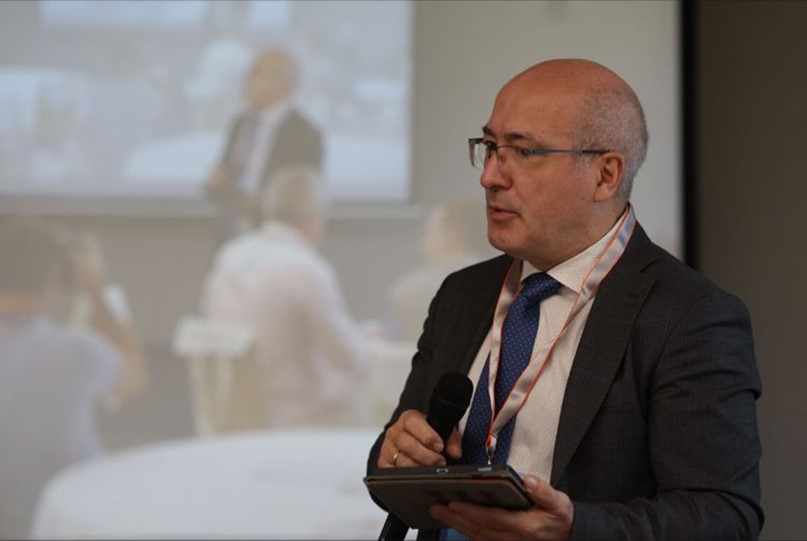
Clustering creates impact
A 2021 report published by the European Commission underlines the correlation between the presence of cluster organisations and high economic and technological performance. In fact, companies integrated in European clusters pay, on average, 13.5% higher wages compared to those that are not part of clusters. In addition, the COVID-19 pandemic demonstrated the clusters’ capacities of resilience and quick adaptation to new realities.
A voice in key fora
ECA demonstrates a strong presence across vital European forums, actively shaping industrial and regional policy. Our participation in the EU Industrial Forum underscores this, where we co-curate two task forces: TF2, which supports the development of industrial Transition Pathways, and TF4, which advocates for cross-border and cross-ecosystem investments. Furthermore, ECA has specialists appointed to each of the forum's five Task Forces, highlighting our comprehensive involvement.
Our engagement extends to several expert groups, including those focused on Interregional Innovation Investments (I3) and Smart Specialisation Strategies (S3), where our voice contributes to steering regional innovation and intelligent specialization.
In addition, the Council for European BioRegions (CEBR) represents ECA in the Health Emergency Preparedness and Response Authority (HERA), emphasizing our commitment to contributing to health emergency preparedness on a European scale.
Concluding, ECA is also represented in the European Economic and Social Committee, where we contribute on economic, social, and related policy areas, ensuring that our industrial perspective is woven into the fabric of European policymaking.
Promoting the role of clusters in Europe
From this influential position, ECA tirelessly defends the role and relevance of cluster networks at European level, influencing industrial policies and demonstrating how clusters enhance the competitiveness of European companies with a particular focus on catalysing European funds towards business innovation projects and, above all, European SMEs.
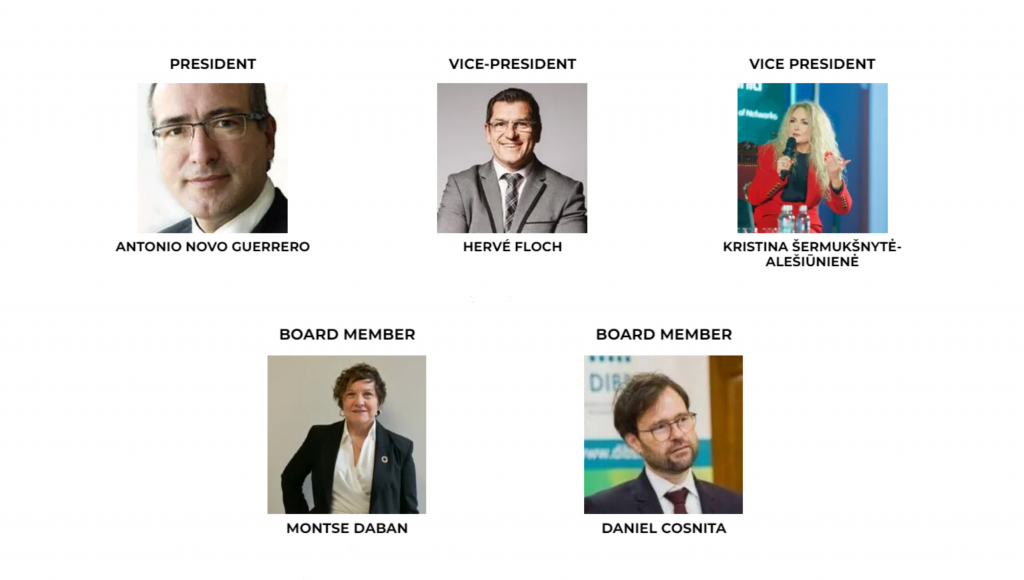
A wide network of clusters in Lithuania
The Lithuanian cluster network KlasterLT, led by K. Šermukšnytė-Alešiūnienė, who has been elected as the new Vice-President of the European Cluster Alliance, was officially established in May 2020, after the signing of the association's founding agreement. Today, the network brings together around 50 clusters, connecting more than 800 companies and research institutions.
“Lithuanian clusters are vital for the growth and resilience of our economy. The development of clusters that operate efficiently and collaborate across sectors and at an international level, as observed in recent years, is boosting the country's GDP growth, innovation, competitiveness, and digitisation. Employment is growing, business networks are getting stronger, and the country's priority to smart specialisation objectives and regional development are being met. To sum up, the country's clusters are the driver of the economy and an integral part of the ecosystem of value chains, enabling our companies to work together to achieve much more ambitious results,” says K. Šermukšnytė-Alešiūnienė.
A significant European project to lower the GHG footprint of the forestry and agrifood industries only includes Lithuanian participants
Ten national partners will carry out the GFarm for LIFE project in accordance with the European Commission's aim of creating a climate-resilient future. Participants in the project's official launch event on September 20 at the Senators' Passage discussed the chance for Lithuania to stand out in Europe by achieving the project's goals: creating a framework for a national carbon sink certification and monitoring system, as well as creating a more effective GHG assessment and registry model for the agriculture, forestry, and other land use sectors.
Although the energy sector has the worst environmental effects, 20–24% of world emissions come from agriculture, forestry, and other land use. The same sector, which includes all of a country's land used for agriculture, is essential for mitigating climate change since it absorbs GHGs through soil, biomass, and wood.
The strategic goals that GFarm for LIFE partners has established will contribute to increasing the effectiveness of this procedure in Lithuania. The project's success is anticipated to serve as a model for identifying approaches to more sustainable land management and enhancing sector resilience at the European level.
"LIFE is the EU's main umbrella programme to promote action on the environment and climate. Lithuania is a leader in the climate change priority, as we are partners in 27 out of 44 projects. GFarm for LIFE's theme of addressing the challenges of agriculture is unique among them all. These are truly great achievements that raise the bar for even more ambitious action and deserve to be proud of the work we have already done," said Kęstutis Šetkus, Deputy Minister of Environment, in his welcome speech, and highlighted the Ministry's focus on the project as a project of great importance at both national and European level.
GFarm for LIFE will be coordinated by the cluster and the digital innovation center, AgriFood Lithuania. Project partners: National Paying Agency (NPA), the State Forest Service, Vytautas Magnus University, the Lithuanian Forest and Land Owners Association (LMSA), JSC ART21, JSC Dojus AGRO, JSC Litagra, JSC Melda, and JSC Strategy LABS.
"We frequently collaborate with foreign partners on worldwide projects, but this is a rare case where everyone involved is from Lithuania. Consequently, the national consortium will have the chance to influence European policy recommendations. Furthermore, the participation of such significant institutions as universities, the agrifood sector, forestry, and the companies that support innovation in these sectors demonstrates that Europe has confidence in us for a good reason. I am confident that a constructive partnership will help to achieve the best results", said Kristina Šermukšnytė-Alešiūnienė, Director of AgriFood Lithuania, sharing the project's prospects.
All participants in the discussion agreed that this initiative represents exceptional potential for Lithuania. The development of a trustworthy GHG credit certification process and registration platform that can be used throughout Europe is being done in collaboration with public agencies, non-profit organizations, academia, and business. Most importantly, the partners regard this activity as long-term, high-impact national cooperation rather than just a project that produces methodology and IT tools.
The budget of almost €2.7 million is supported and partly financed by the Ministry of the Environment of the Republic of Lithuania, with the European Commission contributing 60% of the funds. GFarm for LIFE will run for 3 years.
Lithuanian experts awarded prizes and evaluations in the European Forum of Professional Higher Education in Romania
The year 2023 was announced as the year of future competences, so the 32 nd annual EURASHE conference was dedicated to the topic "Skills for Europe: Mobilizing Higher Education for Resilience and Digital Transformation." From 8 th to 9 th June experts from various countries gathered in Bucharest, Romania, to discuss the needs for future skills and emerging challenges.
Lithuania was actively represented in this international conference by two experts: Dr. Nijolė Zinkevičienė, a member of the EURASHE Board and Deputy Director for Science and Partnership at Vilniaus Kolegija / Higher Education Institution, and Kristina Šermukšnytė-Alešiūnienė, the AgriFood Lithuania DIH Manager, the Best European Cluster Manager of 2022, and a member of the Vilniaus Kolegija Council. Both professionals in their respective fields made a significant impact at this year conference.
Dr. N. Zinkevičienė, a long-standing member of the EURASHE Board, is deeply involved in the most important issues of professional higher education: mission of professional higher education, quality of higher education, modernization of professional higher education in diverse higher education institutions, and research, development, and innovation. Therefore, she was entrusted with moderating the first day of the conference. The Participants actively discussed various topics, such as shaping the future competence policies in Europe, the labor market and industry cooperation, applied research in professional higher education, and successful university partnerships.
On the second day, Dr. N. Zinkevičienė and her colleague Ruth Moran from Athlone Institute of Technology (Ireland) delivered a presentation "RECAPHE: Collaboration Process for Developing Tools to Strengthen Research and Innovation Competencies in Professional Higher Education." This presentation received the conference award "PHE Star Award - Research and Innovation Competences."
In turn, K. Šermukšnytė-Alešiūnienė participated in the panel discussion on "Applied Research in Professional Higher Education." It was the first time a representative from Lithuanian business participated in the European Forum of Professional Higher Education. Her insights and experience greatly enriched the discussion.
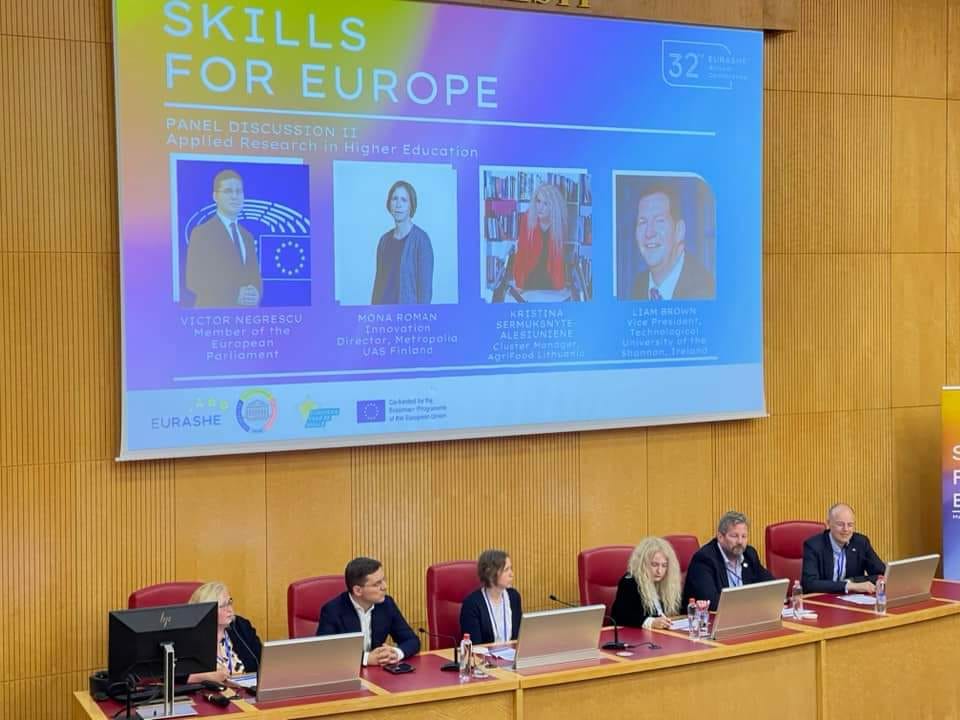
As noted by a conference participant, all stakeholders must strengthen their collaboration to effectively address emerging challenges. Various studies show that the European Union is already facing a shortage of skills among workers. Considering the rapid development of the latest technologies such as artificial intelligence and data analytics, over 40% of jobs will require higher skills in the near future. However, more than 80% of talent development professionals already report a shortage of skills in their organizations.
Businesses face significant challenges, and applied sciences universities, in collaboration with various industry sectors, can help improve and retrain professionals. Moreover, institutions of professional higher education can contribute practically to business growth by becoming research platforms for small and medium-sized enterprises.
EURASHE (European Association of Institutions in Higher Education) is the most significant association of professional higher education institutions in Europe. It brings together and represents European professional higher education institutions, national and sectoral associations of higher education institutions, and other organizations.
EDIH Network Annual Summit Highlights Collaboration for SME Digital Transformation
The first Annual European Digital Innovation Hub (EDIH) Network Summit, held from May 31 to June 1 in Brussels, showcased the latest advancements in digital innovation and fostered collaboration among industry experts and stakeholders.
The Summit is the key European digital innovation event of the year and provides an important platform for knowledge sharing and community building within the EDIH network. The 2023 edition brought together over 300 EDIH representatives, policy makers and civil servants
The Summit featured various keynote speakers, panel discussions, working groups and networking opportunities. Working Group 2 ‘Supporting the Low Digitalised SMEs’ was dedicated to showcasing the findings of the Smart Industrial Remoting study, implemented by PPMI in collaboration with the European Commission.
The working group began with a welcome address from Dr. Heidi Cigan, Senior Policy Officer at DG CNECT, who outlined the study's context and objectives. Following the welcome, Rūta Gabaliņa, Senior Researcher at PPMI, presented the key findings from the digitalisation pilots conducted as part of the study. Rūta shared valuable insights and practical tips for EDIHs on effectively collaborating with SMEs and companies of low digital maturity.
The panel discussion that followed, moderated by Barbora Kudzmanaite, Research Manager at PPMI, featured distinguished speakers including Kristina Šermukšnytė-Alešiūnienė, Director of Agrifood Lithuania, and Anca Sandu, Managing Partner of UnitH2B.
The panelists shared their experiences, success stories, and insights, highlighting the importance of strong partnerships between hubs and SMEs. Key takeaways included the significance of trust building, finding common ground, and showcasing the value of digitalization to establish lasting collaborations.
As Kristina Šermukšnytė-Alešiūnienė has noticed in the discussion, it’s not easy to convince low digitalization SME’s to take a try and see the extra value. EDIHs make outstanding work in changing minds in management and creating networks that work. Being in the innovation community provides the support and inspiration to carry on ensuring sustainable and competitive business. The collaboration between EDIHs and SMEs empowers boths sides to create value together.
The EDIH network plays a crucial role in driving the digital transformation of European businesses. It aligns with the EU's Digital Decade 2030 targets, focusing on accelerating the adoption of advanced digital technologies, supporting the growth of EU unicorns, and ensuring a basic level of digital maturity for SMEs.
The presentation of the Smart Industrial Remoting study at the EDIH Network Annual Summit not only raised awareness of its findings but also emphasized the critical importance of SME digitalization. As the study approaches its final stages, the upcoming milestone involves the development of a Digitalization Toolbox, a valuable resource providing practical tips and guidance for SMEs and EDIHs on implementing digital technologies.
Download the Working group 2 ‘Supporting the Low Digitalised SMEs’ slides HERE.
The first call of the SUAVE project for SMEs is now open!
More than 1 Million € for SMEs to boost European Urban Agriculture towards sustainable and resilient urban food systems, green and digital transition, and internationalization.
About the project
A 30-month pioneering European project, SUAVE EuroCluster, aims to boost urban agriculture (UA) towards sustainable and resilient urban food systems.
An integral part of SUAVE’s concept is the development of urban green spaces, alternative methods of generating and distributing food, new technology applied to cities, environmental issues, and urban planning, along with social aspects of inclusion, integration, and community building.
Short Food Supply Chains (SFSC) and Zero Waste are essential for providing a better environment and also responding to urban population demands. Using new and alternative technologies, such as Industry 4.0 solutions, urban agriculture covers diverse fields, including vertical and indoor farming systems, soilless urban farms (hydroponics, aeroponics, and aquaponics), and Controlled Environment Agriculture (CEA).
EuroCluster gathers five experienced agri-food and digital clusters with the aim of boosting innovation in urban farming systems via networking activities, innovation support, and SMEs’ innovation adoption, as well as training. The project supports SMEs from new ideas in urban agriculture to market entry of new services and products, with 1,050 M€ (over 75% of the budget) designated for SMEs from European countries.
Role of AgriFood Lithuania in SUAVE
As part of its mission, AFL connects its stakeholders with international and cross-sectoral initiatives, provides comprehensive support for research, development, and implementation of agricultural innovations, and has been recognized by the EU Joint Research Center for its excellent industry focus. Every year, AFL organizes international events like the “AgriFood Forum” for business and political leaders, as well as “HACK AgriFood“. These points prove the company’s ability to collaborate with partners from the EU and outside of the EU, and to support SMEs in their digitalization and internationalization efforts. The AFL also contributes to the SUAVE project’s overall activities.
AgriFood Lithuania DIH aims to strengthen the resilience of the EU industrial ecosystems by building value chain interconnections within the EU single market, which serves as a basis for further networking actions and innovation, adoption, and training support.
Who can apply?
European SMEs in the European Urban Agriculture value chain. SMEs should:
- Be an European SME (employing less than 250 persons with an annual turnover of up to EUR 50 million, or a balance sheet total of no more than EUR 43 million) as per the definition of the European Union in line with the EU recommendation 2003/361.
- Provide services, products, supplies, and technologies for the European Urban Agriculture food system
- Be directly or indirectly linked to at least one of the following types of urban agriculture
Important information
- SUAVE application page on the grant platform: https://lnkd.in/g9wWfJQP
- Before starting your application, please carefully read the Guide for Applicants: https://bit.ly/3Kbd0Ae
- Visit the SUAVE European Cluster Collaboration Platform page for more information: https://lnkd.in/g9qSCqQQ
- Follow the news and register for the info sessions, which will be available in April in English, French, Hungarian, Lithuanian, Spanish and Polish!
European Startup Village alliance – serious commitment putting it into practice
On the 7th of February 2023 in Vilnius, Mariya Gabriel, Commissioner for Innovation, Scientific Research, Culture, Education and Youth of the European Union will participate in the largest international StartUp Village networking event for Innovative and Resilient Regional Development. The Cluster and Digital Innovation Hub "AgriFood Lithuania" will bring together stakeholders – science, business, startups, policy makers – to sign the Memorandum for European Startup Village Alliance and agree on practical actions to further contribute in the long-term development of EU regions, including rural areas.
Startup Village as a role model for modern, digital, and innovative rural areas
Startup Village initiative plays a key role in a larger and innovative vision for rural areas in the EU. In 2021, the European Commission set out the Long-Term Vision for the EU’s Rural Areas. The Vision identifies several areas of action toward stronger, connected, resilient and prosperous rural areas and communities by 2040. The Vision recognises the enabling role of innovation to empower citizens and entrepreneurs to seize the opportunities offered by current societal, environmental, and digital transformations. The main goals of the Startup Village are to encourage the creation of start-ups and innovation in rural areas and to create a space for debate and knowledge sharing to solve regional issues.
The host of the event and the director of the digital innovation hub AgriFood Lithuania DIH Kristina Šermukšnytė-Alešiūnienė highlights the importance of this initiative:
"The purposeful direction of the Startup Village could ensure the economic development of the regions, wider application of digital solutions, easier inclusion of young people and women, implementation of the goals of the European Green Deal, and successful adaptation to changes for different businesses. In addition, the implementation of the Startup Village concept would stimulate research and innovation in rural communities and could help create more innovative entrepreneurship that would attract more talented people”.
Ongoing initiative with active involvement and strong support
Startup Village initiative is also an important element of the New European Innovation Agenda to help ensuring that regional innovation ecosystems will take rural areas into account. Organizers of this conference with the support from European Commission have continued to contribute towards this important goal. In November of 2021, AgriFood Lithuania director Kristina Šermukšnytė-Alešiūnienė was invited by the European Commission as a speaker to the first StartUp Village Forum. In February of 2022, AgriFood Lithuania had its first local regional event on the StartUp Village topic as a part of the EU Industry week. Later in the year, AgriFood Lithuania was asked to organise the international hackathon "HACK Startup Village 22", under the patronage of Mariya Gabriel, European Commissioner for Innovation, Research, Education, Youth and Culture.
StartUp Village networking event for Innovative and Resilient Regional Development
Commissioner Gabriel will participate in the upcoming Startup Village networking event in Vilnius. The Commissioner recognises the innovation potential for rural areas and the startup based innovation ecosystems of these areas to create high value.
“We need to overcome the belief that innovation takes place only in cities or metropolitan areas. It is of utmost importance to revitalise rural areas and mobilise their innovation potential for growth and wellbeing of all EU citizens. With this aim, the New European Innovation Agenda, adopted by the European Commission last July, includes a flagship action to support innovation ecosystems and include innovation cohesion across Europe. The Startup Village initiative will contribute to this goal” says Mariya Gabriel.
Next stage in the ongoing initiative – European Startup Village Alliance
The networking event is a next step in the agenda for regional development to gather all key stakeholders and agree on the further action plan. Collaboration is required to support funds and investments, build the infrastructure rural entrepreneurs need to succeed, assist them in developing new skills, provide chances for test-before-investment, and provide businesses the chance to test their ideas in real-world settings. It is important to include local businesses, farmers, research organisations, local governmental officials, and citizens to establish a startup environment with shared values in rural areas. To bring together key stakeholders to share insights on obstacles and potentials for rural innovation and rural innovators, the European Startup Village Alliance will be launched at the event.
Among the Startup Village Alliance members – EIT Food, Europe’s leading food innovation initiative, working to make the food system more sustainable, healthy and trusted. The presence of EIT Food CEO, Andy Zynga, marks the power that this alliance will have on the regional development process.
“The alliance will enable all countries to unite in working towards a common goal - to develop rural areas by making them attractive to innovators who would create wealth and jobs. The startups play a very important role in this process while bringing new technologies and products that could be a game changer in rural areas. I strongly believe in leveraging our organizations community members and expertise to empower startups to have the broadest possible impact and unlock new opportunities on regional development this way.”
Other members of the alliance are SmartAgriHubs, DIH’s network of Networks, European Clusters Alliance.
This conference is free of charge and will be broadcast live across Europe. Participants are invited to register and participate remotely or live here.


